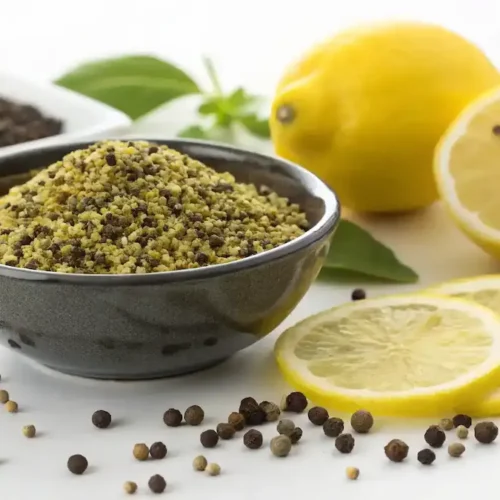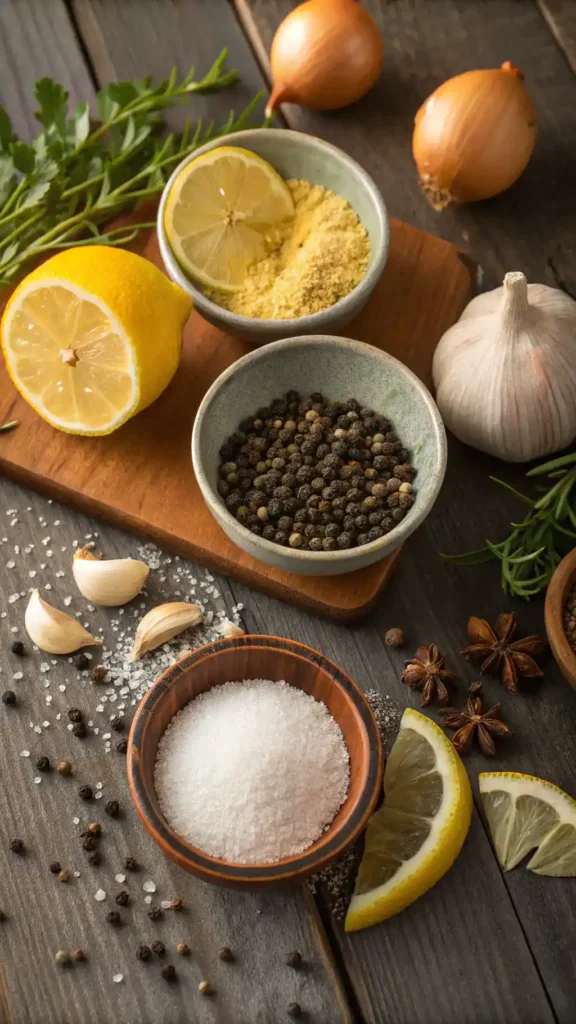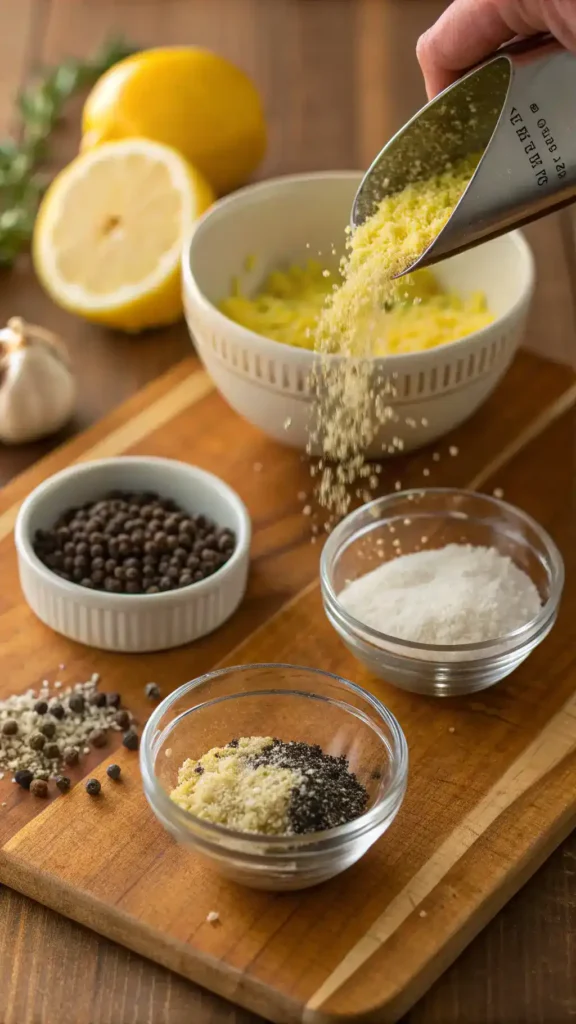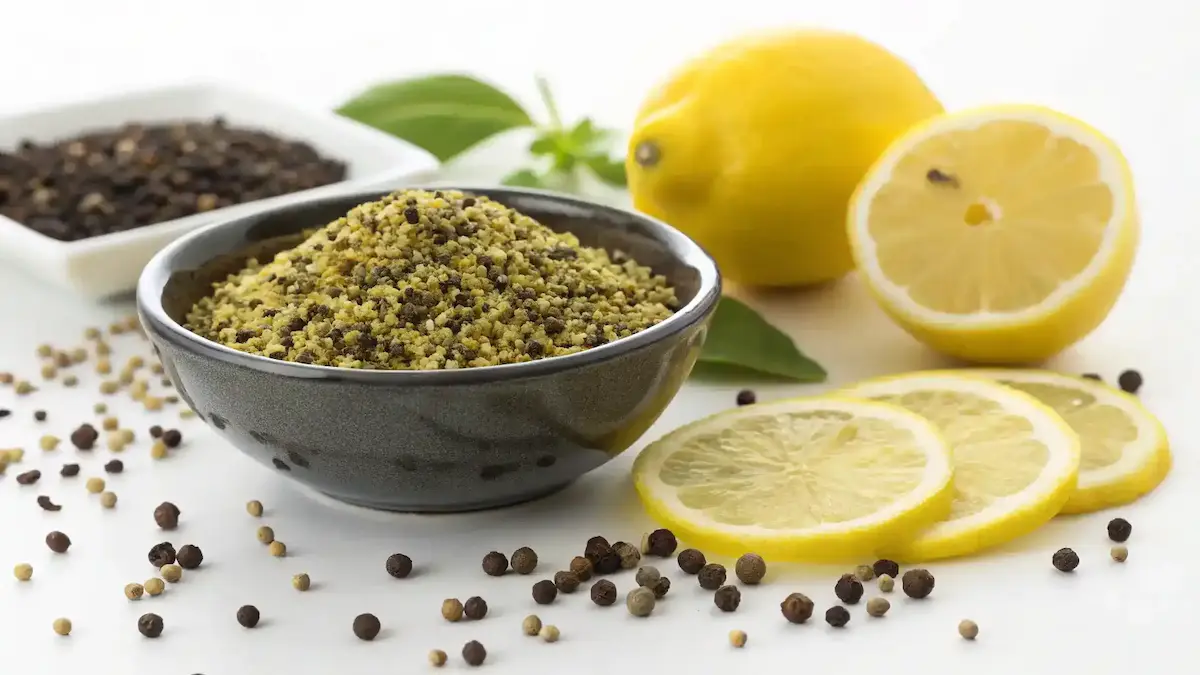Have you ever wondered how a simple blend of lemon and black pepper can transform your dishes? Lemon pepper seasoning is not only a culinary staple but also a delightful way to enhance flavors. This versatile seasoning brings a zesty kick to everything from grilled meats to roasted vegetables. Moreover, it offers health benefits, such as antioxidant properties and digestive aid, making it a low-calorie seasoning choice for health-conscious cooks. In this article, we will explore the ingredients, preparation steps, and creative uses of lemon pepper seasoning, ensuring you can elevate your meals effortlessly.

lemon pepper seasoning
Equipment
- 1 Microplane or Zester For zesting the lemons.
- 1 Dry Skillet For toasting the peppercorns.
- 1 Spice Grinder or Food Processor For grinding the seasoning mixture.
- 1 Airtight container For storing the seasoning.
Ingredients
Base Ingredients
- 1 lemon Fresh Lemon Zest Use the zest of a bright, juicy lemon.
- 2 tablespoons Black Peppercorns Opt for whole black peppercorns for a fresher taste.
- 1 tablespoon Garlic Powder Brings a savory depth to the seasoning.
- 1 tablespoon Onion Powder Adds subtle sweetness and complexity.
- 1 teaspoon Sea Salt Choose a fine sea salt for balanced seasoning.
Optional Spices
- 1 pinch Cayenne Pepper For added heat, optional.
- 1 teaspoon Dried Thyme For extra flavor, optional.
Instructions
Preparation Steps
- Gather your ingredients: fresh lemon zest, black peppercorns, garlic powder, onion powder, and sea salt. Include optional spices if desired.
Zesting
- Zest the lemons using a microplane or zester, avoiding the bitter white pith.
Toasting
- Toast the black peppercorns in a dry skillet over medium heat for 2-3 minutes, then let them cool.
Mixing
- Combine the lemon zest, toasted black peppercorns, garlic powder, onion powder, and sea salt in a bowl. Add optional spices if using.
Grinding
- Transfer the mixture to a spice grinder or food processor and pulse until fine. Adjust texture to preference.
Storage
- Store the seasoning in an airtight container in a cool, dark place for up to six months.
Video
Notes
Table of Contents
Key Benefits
Lemon pepper seasoning is not just a delightful blend; it’s a culinary game-changer! First and foremost, it enhances the flavor of your dishes, making even the simplest meals burst with zest. Additionally, this seasoning offers numerous health benefits. For instance, lemon is rich in vitamin C, while black pepper contains antioxidants. Together, they create a low-calorie seasoning that’s perfect for health-conscious cooking.
Moreover, lemon pepper seasoning is incredibly versatile. You can sprinkle it on grilled meats, roasted vegetables, or even seafood dishes. It also works wonders in salad dressings and marinades. So, whether you’re whipping up a quick weeknight dinner or preparing for a special occasion, this seasoning can elevate your culinary creations.
Furthermore, it acts as a digestive aid, helping your body process food more efficiently. The aromatic profile of lemon pepper seasoning not only tantalizes your taste buds but also adds a refreshing scent to your kitchen. In summary, incorporating lemon pepper seasoning into your cooking routine is a simple way to boost flavor and health benefits alike!
Ingredients for Lemon Pepper Seasoning
Creating your own lemon pepper seasoning is not only simple but also incredibly rewarding. The right ingredients can elevate your dishes to new heights. Here’s what you’ll need:
- Fresh Lemon Zest: Use the zest of a bright, juicy lemon. It adds a vibrant citrus flavor that dried lemon cannot match.
- Black Peppercorns: Opt for whole black peppercorns for a fresher taste. Grinding them yourself will enhance the aromatic profile.
- Garlic Powder: This ingredient brings a savory depth to the seasoning. If you prefer, you can use fresh minced garlic, but remember it may alter the shelf life.
- Onion Powder: This adds a subtle sweetness and complexity. It’s a great complement to the other flavors.
- Sea Salt: Choose a fine sea salt for a balanced seasoning. It enhances all the flavors without overpowering them.
- Optional Spices: Consider adding a pinch of cayenne pepper for heat or dried herbs like thyme for an extra layer of flavor.

When selecting your ingredients, freshness is key. Fresh lemon zest will provide a brighter flavor compared to dried alternatives. Additionally, if you’re out of garlic powder, you can substitute it with garlic salt, but be cautious with the amount of additional salt you add. Overall, these ingredients combine beautifully to create a versatile lemon pepper seasoning that can be used in countless dishes.
How to Make Lemon Pepper Seasoning
Making your own lemon pepper seasoning is not only simple but also incredibly rewarding. Follow these easy steps to create a vibrant and flavorful seasoning that will elevate your dishes. Let’s get started!
- Gather Your Ingredients: You will need fresh lemon zest, black peppercorns, garlic powder, onion powder, and sea salt. Additionally, you can include optional spices like dried herbs for extra flavor.
- Zest the Lemons: Begin by zesting your lemons. Use a microplane or a zester to remove the outer yellow layer of the lemon peel. Be careful not to include the bitter white pith. This zest is the star of your lemon pepper seasoning!
- Toast the Peppercorns: For a deeper flavor, toast the black peppercorns in a dry skillet over medium heat for about 2-3 minutes. This step enhances their aroma and flavor. Once toasted, let them cool.
- Combine Ingredients: In a bowl, mix the lemon zest, toasted black peppercorns, garlic powder, onion powder, and sea salt. If you’re using any optional spices, add them now. This is where you can customize your seasoning to your taste!
- Grind the Mixture: Transfer the mixture to a spice grinder or a food processor. Pulse until you achieve a fine consistency. If you prefer a coarser texture, grind it less. Remember, the balance of flavors is key!
- Store Properly: Once ground, transfer your lemon pepper seasoning to an airtight container. Store it in a cool, dark place. This will help maintain its freshness and flavor for up to six months.

And there you have it! Your homemade lemon pepper seasoning is ready to use. This seasoning is not only a flavor enhancer but also a low-calorie option that brings a delightful zing to your meals. Enjoy experimenting with it in various dishes!
Pro Tips, Variations, and Common Problems
When it comes to making your own lemon pepper seasoning, a few insider tips can elevate your blend from good to great. Here are some pro tips to keep in mind:
- Freshness Matters: Always use fresh lemon zest for the best flavor. Dried zest can lose its aromatic profile, so zest your lemons just before mixing.
- Grind Your Own: For a more vibrant flavor, consider grinding your own black peppercorns. This step enhances the seasoning’s freshness and potency.
- Adjust to Taste: Feel free to tweak the ratios of lemon zest to black pepper according to your preference. If you prefer a more citrusy kick, add more zest!
- Experiment with Additions: You can add garlic powder, onion powder, or even a pinch of cayenne pepper for an extra kick. These ingredients can create a unique twist on the classic lemon pepper seasoning.
- Storage Tips: Store your seasoning in an airtight container in a cool, dark place. This will help maintain its flavor and freshness for up to six months.
Now, let’s talk about some common problems you might encounter while making lemon pepper seasoning and how to troubleshoot them:
- Texture Issues: If your seasoning feels too coarse, you can pulse it in a spice grinder or food processor. This will create a finer blend that adheres better to your dishes.
- Overpowering Flavor: If you find your seasoning too strong, try balancing it with a bit of salt or sugar. This can help mellow out the intensity.
- Loss of Aroma: If your seasoning loses its aromatic profile, it may be due to stale ingredients. Always check the freshness of your spices before using them.
- Clumping: If your seasoning clumps together, it might be due to moisture. Ensure your container is completely dry before storing your seasoning.
By keeping these tips and troubleshooting techniques in mind, you’ll be well on your way to mastering your homemade lemon pepper seasoning. Enjoy experimenting with flavors and finding the perfect blend that suits your taste!
Serving Suggestions for Lemon Pepper Seasoning
When it comes to serving dishes seasoned with lemon pepper, the possibilities are as bright and zesty as the seasoning itself! This versatile blend not only enhances flavors but also elevates the presentation of your meals. Here are some delightful serving suggestions that will surely impress your guests.
Plating Ideas
To make your dish visually appealing, consider these plating tips:
- Use a large, white plate to create a beautiful contrast with the vibrant colors of your food.
- Arrange grilled chicken or fish in the center, garnished with fresh herbs like parsley or cilantro for a pop of green.
- Drizzle a light lemon-infused olive oil around the plate for an elegant touch.
Side Dish Pairings
Pairing your lemon pepper seasoned dish with the right sides can enhance the overall dining experience. Here are some ideas:
- Roasted vegetables, such as asparagus or bell peppers, complement the citrusy notes beautifully.
- Quinoa or couscous salad with cherry tomatoes and cucumbers adds a refreshing crunch.
- For a heartier option, serve with creamy mashed potatoes or a light lemon risotto.
Creative Serving Options
Whether you’re hosting a casual get-together or an elegant dinner party, here are some creative serving styles:
- For a family-style meal, serve lemon pepper chicken in a large dish, allowing guests to help themselves.
- For a more refined setting, plate individual servings with a side of sautéed greens and a lemon wedge.
- Consider a casual picnic setup with lemon pepper shrimp skewers, served alongside a refreshing salad.
In conclusion, using lemon pepper seasoning opens up a world of culinary creativity. By focusing on presentation and thoughtful pairings, you can transform a simple meal into a memorable dining experience. So, gather your loved ones, and enjoy the delightful flavors that lemon pepper seasoning brings to your table!
Preserving and Reheating Lemon Pepper Seasoning
When it comes to storing lemon pepper seasoning, the key is to keep it fresh and flavorful for as long as possible. First and foremost, always opt for an airtight container. This will protect your seasoning from moisture and air, which can diminish its vibrant flavor. Glass jars or high-quality plastic containers work wonderfully. Additionally, if you want to extend its shelf life even further, consider vacuum-sealing your seasoning. This method removes air and locks in flavor, making it a fantastic option for long-term storage. If you choose to refrigerate your lemon pepper seasoning, it can last up to six months. On the other hand, freezing it can keep it fresh for up to a year. However, remember to label your containers with the date to keep track of freshness. Food safety is crucial, so always check for any signs of spoilage, such as unusual odors or discoloration, before using your seasoning.
Reheating Methods
Now, let’s talk about reheating dishes seasoned with lemon pepper. The goal is to preserve that delightful flavor and texture. One effective method is to use the stovetop. Simply add a splash of water or broth to your pan, then gently heat your dish over low to medium heat. This will help maintain moisture while warming it up. Alternatively, you can use the microwave, but be cautious. Place your dish in a microwave-safe container, cover it loosely with a lid or microwave-safe wrap, and heat in short intervals, stirring in between. This ensures even heating without drying out your food. If you’re using an oven, preheat it to a low temperature, around 300°F (150°C). Place your dish in an oven-safe dish, cover it with foil, and heat for about 10-15 minutes. This method is particularly great for larger portions. Lastly, if you have an air fryer, it can be a game-changer. Set it to a low temperature and heat your dish for a few minutes, checking frequently to avoid overcooking. By following these methods, you can enjoy your lemon pepper seasoning’s zesty kick just as if it were freshly made!
Conclusion
As we wrap up this delightful journey of making lemon pepper seasoning, let’s take a moment to appreciate how simple and rewarding this process truly is. By combining fresh lemon zest, aromatic black pepper, and a few other spices, you’ve created a versatile seasoning that can elevate countless dishes. Whether you sprinkle it on grilled chicken, toss it with roasted vegetables, or mix it into salad dressings, this homemade seasoning is a culinary staple that enhances flavor without overwhelming your meals. So, don’t hesitate to give it a try! You’ll find that making lemon pepper seasoning is not only easy but also a fun way to express your creativity in the kitchen.
We would love to hear about your experiences! Feel free to share your results or ask any questions you might have. Additionally, don’t be afraid to experiment with variations or add your favorite spices to create a personalized blend. Remember, cooking is all about exploration and enjoyment. With lemon pepper seasoning in your repertoire, you’re well on your way to discovering new flavor combinations and making your meals even more delightful. Happy cooking!
Frequently Asked Questions about Lemon Pepper Seasoning
Curious about lemon pepper seasoning? You’re not alone! Here are some common questions and helpful answers to enhance your culinary adventures.
1. What is lemon pepper seasoning made of?
Lemon pepper seasoning typically consists of fresh lemon zest, black pepper, and salt. Additionally, many recipes include garlic powder and onion powder for extra flavor. You can also customize it with optional spices like paprika or herbs to suit your taste.
2. How can I use lemon pepper seasoning in my cooking?
You can use lemon pepper seasoning in various dishes! It’s fantastic on grilled meats, roasted vegetables, and seafood. Moreover, it works well in marinades and salad dressings. Just sprinkle it on before cooking or mix it into your favorite recipes for a zesty kick.
3. Can I make lemon pepper seasoning at home?
Absolutely! Making lemon pepper seasoning at home is simple. Just combine equal parts of dried lemon zest and black pepper, then add salt to taste. You can adjust the ratios based on your flavor preferences. Furthermore, using fresh lemon zest will give your seasoning a vibrant flavor.
4. How should I store lemon pepper seasoning?
To keep your lemon pepper seasoning fresh, store it in an airtight container in a cool, dark place. This way, it can last for several months. However, for the best flavor, try to use it within a few weeks. If you notice any loss of aroma, it might be time to make a new batch!
5. Is lemon pepper seasoning healthy?
Yes, lemon pepper seasoning can be a healthy addition to your meals! It’s low in calories and contains antioxidants from the lemon. Additionally, black pepper may aid digestion. Just remember to use it in moderation, especially if you’re watching your sodium intake.

